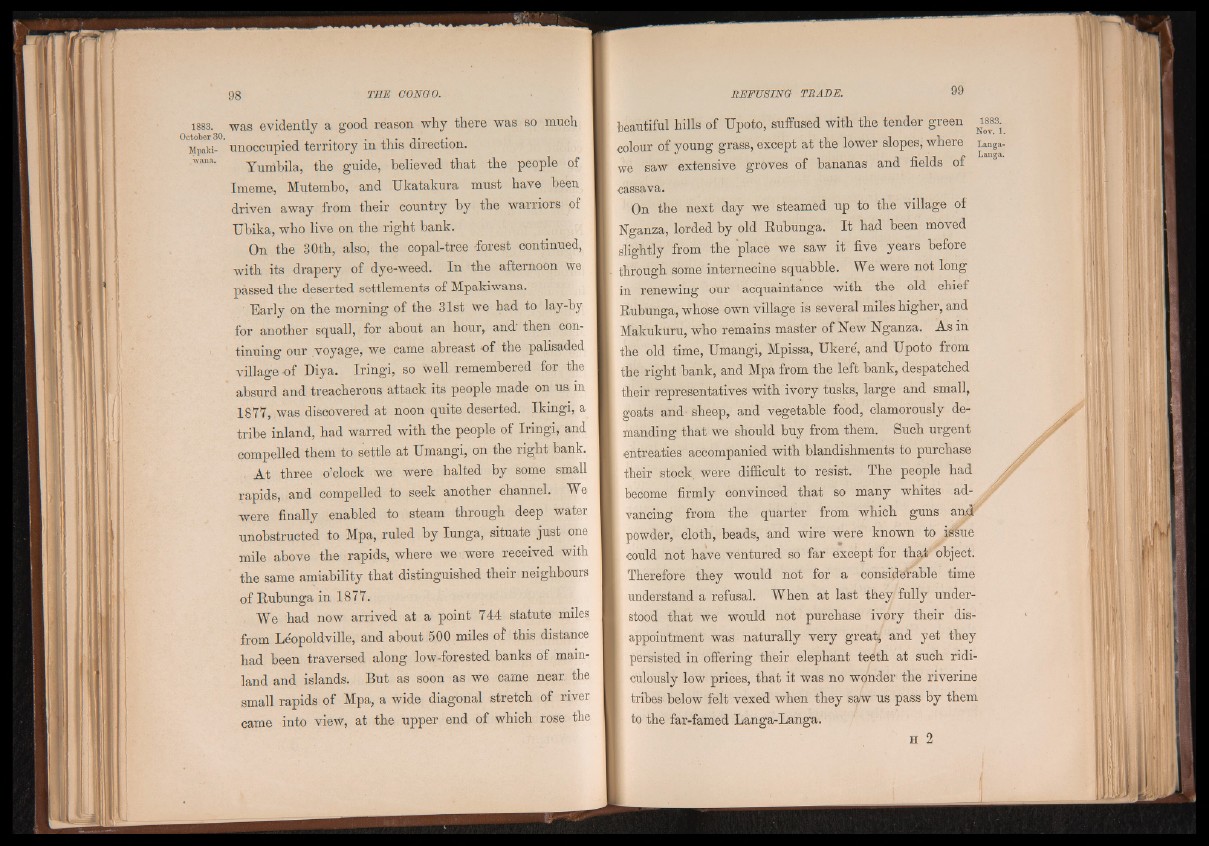
1883.
October 30
Mpaki- wana.
was evidently a good reason why there was so much
unoccupied territory in this direction.
Yumbila, the guide, believed that the people of
Imeme, Mutembo, and Ukatakura must have been
driven away from their country by the warriors of
Ubika, who live on the right bank.
On the 30th, also, the copal-tree -forest continued,
with its drapery of dye-weed. In tbe afternoon we
passed the deserted settlements of Mpakiwana.
Early on the morning of the 31st we had to lay-by
for another squall, for about an hour, and' then continuing
our voyage, we came abreast o f the palisaded
village of Diya. Iringi, so well remembered for the
absurd and treacherous attack its people made on us m
1877, was discovered at noon quite deserted. Ikingi, a
tribe inland, had warred with the people of Iringi, and
compelled them to settle at Umangi, on the right bank.
. At three o’clock we were halted by some small
rapids, and compelled to seek another channel. We
were finally enabled to steam through deep water
unobstructed to Mpa, ruled by Iunga, situate just one
mile above the rapids, where we were received with
tbe same amiability that distinguished their neighbours
of Rubunga in 1877.
We had now arrived at a point 744 statute miles
from Leopoldville, and about 500 miles of this distance
had been traversed along low-forested banks of mainland
and islands. But as soon as we came near the
small rapids of Mpa, a wide diagonal stretch of river
came into view, at the upper end of which rose the
beautiful hills of Upoto, suffused with the tender green ^883.
colour of young grass, except at the lower slopes, where Langa
we saw extensive groves of bananas and fields of
cassava.
On the next day we steamed up to the village of
Nganza, lorded by old Rubunga. I t had been moved
slightly from the place we saw it five years before
through some internecine squabble. We were not long
in renewing our acquaintance with the old chief
Rubunga, whose own village is several miles higher, and
Makukuru, who remains master of New Nganza. As in
the old time, Umangi, Mpissa, Ukeré, and Upoto from
the right bank, and Mpa from the left bank, despatched
their representatives with ivory tusks, large and small,
goats and sheep, and vegetable food, clamorously demanding
that we should buy from them. Such urgent
entreaties accompanied with blandishments to purchase
their stock, were difficult to resist. The people had
become firmly convinced that so many whites ad- x
vancing from the quarter from which guns and
powder, cloth, beads, and wire were known to isiiue
could not have ventured so far except for that object.
Therefore they would not for a considérable time
understand a refusal. When at last they fully understood
that we would not purchase ivory their disappointment
was naturally very great; and yet they
persisted in offering their elephant teeth at such ridiculously
low prices, that it was no wonder the riverine
i tribes below felt vexed when they saw us pass by them
\ to the far-famed Langa-Langa.
h 2